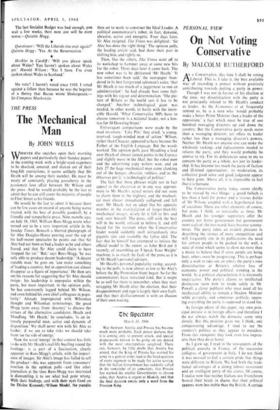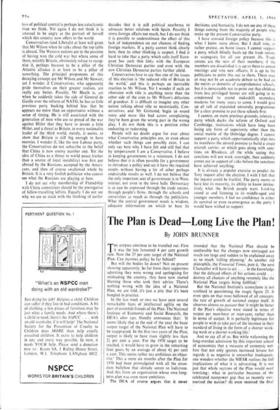PERSONAL VIEW On Not Voting
Conservative
By MALCOLM RUTHERFORD
a Conservative, this time I shall be voting Liberal. This is, I take it, the best available way of recording a protest without positively contributing towards putting a party in power. Though I was not in favour of his election at the time, my dissatisfaction with the party is not principally related to Mr Heath's conduct as leader. As the Economist et al. frequently remind us, he is a man who 'would probably make a better Prime Minister than a leader of the opposition,' a fact which must be true of one hundred managing directors up and down the country. But the Conservative party needs more than a managing director, yet offers its leader rather less than a managing director's powers. Neither Mr Heath nor anyone else can make the wholesale sackings and replacements needed to reform the party, and they would probably be unwise to try. For its deficiencies seem to me to concern the party as a whole, not just its leader- ship. It has become too much the party of faction and ill-timed opportunism : its moderation, its collective good sense and good judgment appear to have gone. Above all, it is impossible to feel that it is humane.
The Conservative party today seems chiefly to be moved by two things : a greed (which is less than a lust) for power and a vicious dislike of Mr Wilson, coupled with a hypothetical fear of socialism. There are other elements, of course, but none, I think, so noticeable as these. Mr Heath and his younger supporters offer the country not better government but government more radical; the two words have become synony- mous. The party takes an evident pleasure in describing the virtues of more competition and will frequently cite in its publications the need for certain people to be pushed to the wall, a state of mind which seems to show no more than a desire to believe that if sonie people are being hurt, others must be progressing. This is perhaps only a wish to take out on others the party's own dissatisfaction at Britain's relative loss of economic power and political standing in the world. As a political characteristic it is extremely unattractive. The party's claims to intellectual distinction seem now to reside solely in Mr Powell, a clever publicist who must need all his intellectual ability to remain a Shadow Minister while privately. and sometimes publicly, oppos- ing everything the party is supposed to stand for.
As foreign editor of this paper, my own prin- cipal interest is in foreign affairs and therefore I do not always watch the domestic scene very closely. But this position gives me. I think, one compensating advantage. I tend to see the country's politics as they appear to outsiders. From this viewpoint they look even less impres- sive than they do at home.
As I grew up, I read in the newspapers of the political anarchy in France. of the successive collapses of government in Italy. I do not think it was unusual to feel a certain pride that things were different in Britain. We had both the tradi- tional advantages of a strong labour movement and an intelligent party of the centre. Of course, I realise now that neither Italians nor Frenchmen bowed their heads in shame that their political systems were less stable than the British. A certain loss of political control is perhaps less cataclysmic than we think. Yet again I do not think it is unusual to be angry at the portrait of herself which this country now offers to the world.
Conservatives (and Liberals) at least will grant that Mr Wilson when he talks about the top table is absurd. The Western nations are in the position of having won the cold war but where some of them, notably'Britain, obstinately refuse to recog- nise it, perhaps because to be a pillar of the Atlantic alliance is at least to be a pillar of something. The principal proponents of this decaying concept are Mr Wilson and Mr Stewart, yet I wonder if Conservatives, who apparently pride themselves on their greater realism, are really any better. Possibly Mr Heath is, yet when he suddenly takes the side of General de Gaulle over the reform of NATO, he has so little previous party backing behind him that he appears no more than an opportunist without a sense of timing. He is still associated with the generation of men who are so proud of the war against Hitler that they have to invent a little Hitler, and a threat to. Britain, in every nationalist leader of the third world, merely, it seems, to show that Britain is still big enough to have enemies. I wonder if, like the new Labour party, the Conservatives do not subscribe to the belief that China is now enemy number one. Yet the idea of China as a threat to world peace (rather than a source of local instability) was first put abroad by the Russians, accepted by the Ameri- cans, and then of course swallowed whole by Britain. It is a very foolish politician who cannot see what the Russians are playing at here.
I do not see why membership of Friendship with China committees should be the prerogative of fellow-travelling leftists. Equally I do not see why we are so stuck with the thinking of earlier decades that it is still political anathema to advocate better relations with Spain. Possibly I stress foreign affairs too much, but I do not think it is possible to underestimate the effect of this lack of independence on our chances of finding foreign markets. If a party cannot think clearly here, then its other thinking is suspect. I find it hard to take that a party which calls itself Euro- pean has such thin links with the European Christian Democrat parties and even with the new Christian Democrat parties further afield.
Conservatives love to say that one of the issues of this election is 'the reduced role of Britain in the world,' and this is perhaps an inevitable reaction to Mr Wilson. Yet 1 wonder if such an obsession with role is anything more than the other side of the coin to Mr Wilson's delusions of grandeur. It is difficult to imagine any other nation talking about role so neurotically. Con- servatives, and Mr Grimond, begin to sound more and more like bad actors complaining they've been given the wrong part in the wrong play. I do not think this is a position either endearirig or redeeming.
People will no doubt argue for ever about what Conservative principles are, or even about whether such things can possibly exist. I can only say here why 1 have felt and still feel that by temperament I am a Conservative. I believe in keeping government to a minimum. I do not believe that it is often possible for a government to introduce a policy and see it have the required results without having a lot of other perhaps undesirable results as well. I do not believe that the only important seat of government is in West- minster, nor even in the town halls. Democracy is or can be expressed through the trade unions, through people's firms, through the schools and universities as much as through the politicians. What the central government needs is wisdom, adequate information on which to base its decisions, and humanity. 1 do not see any of these things coming from the majority of people who make up the present Conservative party.
1 have stressed foreign policy because this is what I know more about. But I shall vote, or rather protest, on home issues. I cannot support a party which blindly hauls up the trade unions as scapegoats for all our present ills. Trade unions are the sum of their members; if the members are dissatisfied it is up to them to attend meetings and vote new officers. It is up to the politicians to point this out to them. There may or may not be an academic debate to be had on the merits or demerits of comprehensive schools, but it is inexcusable not to point out that children from less privileged homes are still going to be condemned to attend makeshift secondary moderns for many years to come. 1 would give up all talk of expanded university programmes for a clear promise to put these schools first.
1 cannot, on more precious grounds, tolerate a party which ducks the reform of Oxford and Cambridge, institutions which have long been losing any form of superiority other than the social mantle of the Oxbridge degree. I cannot support a party which opportunistically slips into its manifesto the absurd promise to build a single aircraft carrier. or which goes along with sanc- tions on Rhodesia. .all the while saying that sanctions will not work overnight, then suddenly comes out in support of talks before the sanctions
have achieved anything. , It is already a popular exercise to predict the Tory inquest after the election. I wish I felt that the inquest could be fruitful. The party seems to have lost its maturity, its ability to know instinc- tively what the British people want. Looking round at and listening to its middle-aged and younger members, I feel no confidence in either its survival or even re-emergence as the party I would have wished to support.



































 Previous page
Previous page